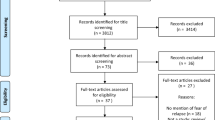Summary
We report a predictive study, carried out in Sydney Australia, investigating the association between the Expressed Emotion (EE) status of the household to which the patient is discharged and schizophrenic relapse. Expressed Emotion was not related to illness severity either at admission or discharge, but was related to variables reflecting chronicity and employment history. There was a significant association between returning to a high EE household and both re-hospitalisation and relapse. The significant association between EE and relapse held only for: patients not on medication, males, and those patients in high contact with their relatives. A discriminant function analysis found that decline in occupational status and the number of critical comments expressed by the relative were the strongest predictors of relapse. The results presented here are consistent with the majority of published reports on EE and relapse and contradict the negative findings of a recently published but smaller study also carried out in Sydney.
Similar content being viewed by others
References
Barrowclough C, Tarrier N (1990) Social functioning in schizophrenic patients. I. The effect of expressed emotion and family intervention. Soc Psychiatry Psychiatr Epidemiol 25: 125–129
Brown G, Birley JLT, Wing JK (1972) Influences of family life on the course of schizophrenic disorders: replication. Br J Psychiatry 121: 241–258
Cazullo CL, Bertrando P, Bressi C et al. (1988) Emotivita expressa e schizofrenia: studio prospettico di replicazione. Notizie ARS [Suppl] 88: 16–21
Congalton AA (1969) Status and prestige in Australia. Cheshire Publications, Melbourne
Falloon IRH (1988) Expressed emotion: current status. Psychol Med 18: 269–274
Hogarty GE (1985) Expressed emotion and schizophrenic relapse: implications from the Pittsburgh study. In: Alpert M (ed) Controversies in schizophrenia. Guilford, New York
Hogarty GE, Anderson CM, Reiss DJ et al. (1986) Family psychoeducation, social skills training and maintenance chemotherapy in the aftercare treatment of schizophrenia. I. One year effects of a controlled study on relapse and expressed emotion. Arch Gen Psychiatry 43: 633–642
Kuipers L, Bebbington P (1988) Expressed emotion research in schizophrenia; theoretical and clinical implications. Psychol Med 18: 893–909
Karno M, Jenkins JH, De la Silva A et al. (1987) Expressed emotion and schizophrenic outcome among Mexican-American families. J Nerv Ment Dis 175: 143–151
Leff JP, Vaughn C (1985) Expressed Emotion in families. Guilford, New York
Leff JP, Wig N, Ghosh A et al. (1987) Influence of relative's expressed emotion on the course of schizophrenia in Chandigarh. Br J Psychiatry 151: 166–173
Leff JP, Berkowitz R, Shavit N et al. (1989) A trial of family therapy vs a relatives' group for schizophrenia. Br J Psychiatry 154: 58–66
MacMillian JF, Gold A, Crow TJ et al. (1986) The Northwick Park study of first episodes of schizophrenia. IV. Expressed emotion and relapse. Br J Psychiatry 148: 133–143
Miklowitz D, Goldstein MJ, Falloon IRH (1983) Premorbid and symptomatic characteristics of schizophrenics from families with high and low levels of expressed emotion. J Abnorm Psychol 92: 359–367
Milne D (1988) Organisational behaviour management in a psychiatric day hospital. Behav Psychother 16: 177–188
Mintz LI, Nuechterlein KH, Goldstein MJ et al. (1989) The initial onset of schizophrenia and family expressed emotion: some methodological considerations. Br J Psychiatry 154: 212–217
Moline RA, Singh S, Morris A et al. (1985) Family expressed emotion and relapse in schizophrenia in 24 urbane American patients. Am J Psychiatry 142: 1078–1081
Nuechterlein KH, Snyder KS, Dawson ME et al. (1986) Expressed emotion, fixed dose fluphenazine decanoate maintenance and relapse in recent onset schizophrenia. Psychopharmacolog Bull 22: 633–639
Parker G, Johnston P, Hayward L (1988) Parental expressed emotion as a predictor of schizophrenic relapse. Arch Gen Psychiatry 45: 806–813
Rostworowska M, Barbaro B, Cechnicki A (1987) The influence of expressed emotion on the course of schizophrenia: a polish replication. Poster presented at the 17th Congress of the European Association for Behaviour Therapy, Amsterdam
Kottgen C, Sonnichsen I, Mollenhauser K (1984) Results of the Hamburg Camberwell family interview study, I–III. Int J Fam Psychiatry 5: 61–94
Tomaras V, Vlachonikolis JG, Stefanis CN et al. (1988) The effect of individual psychosocial treatment on the family atmosphere of schizophrenic patients. Soc Psychiatry Psychiatr Epidemiol 23: 256–261
Tarrier N, Barrowclough C, Vaughn C et al. (1988) The community management of schizophrenia: a controlled trial of a behavioural intervention with families to reduce relapse. Br J Psychiatry 153: 532–542
Tarrier N, Turpin G (1991) Electrodermal activity in schizophrenia: a review. Br J Psychiatry (submitted for publication)
Turpin G, Tarrier N, Sturgeon D (1988) Social psychophysiology and the study of biopsychosocial models of schizophrenia. In: Wagner H (ed) Social psychophysiology: perspectives on theory and clinical application. Wiley, Chichester
Vaughn C, Leff JP (1976) The influence of family and social factors on the course of psychiatric illness: a comparison of schizophrenia and depressed neurotic patients. Br J Psychiatry 129: 125–137
Vaughn C, Snyder KS, Freeman W et al. (1984) Family factors in schizophrenic relapse: a replication in California of the British research on expressed emotion. Arch Gen Psychiatry 41: 1169–1177
Vaughan K, Doyle M, McConaghy N et al. (1991) The Sydney intervention trial: a controlled trial of relative's counselling to reduce schizophrenic relapse. Soc Psychiatry Psychiatr Epidemiol 27: 16–21
Vaughn C (1986) Comments on Dulz and Hand. In: Goldstein MJ, Hand I, Halweg K (eds). Treatment of schizophrenia: family assessment and intervention. Springer, Berlin Heidelberg New York
Author information
Authors and Affiliations
Rights and permissions
About this article
Cite this article
Vaughan, K., Doyle, M., McConaghy, N. et al. The relationship between relative's Expressed Emotion and schizophrenic relapse: an Australian replication. Soc Psychiatry Psychiatr Epidemiol 27, 10–15 (1992). https://doi.org/10.1007/BF00788950
Accepted:
Issue Date:
DOI: https://doi.org/10.1007/BF00788950



